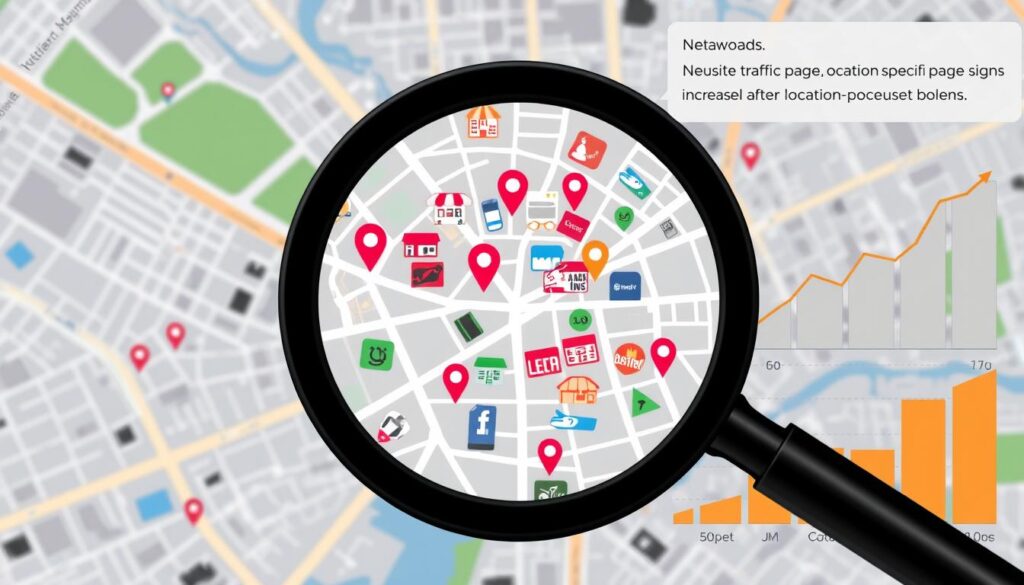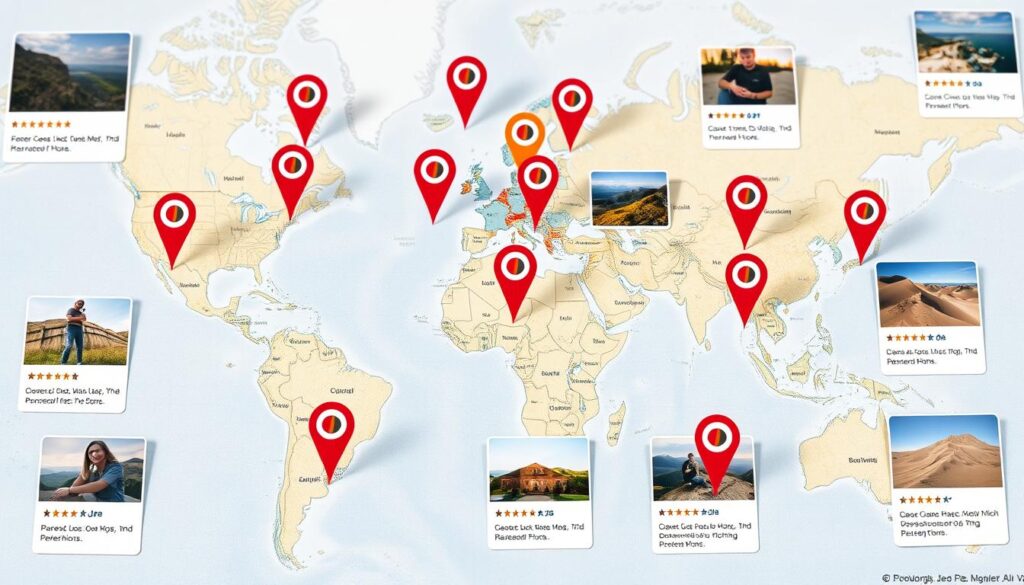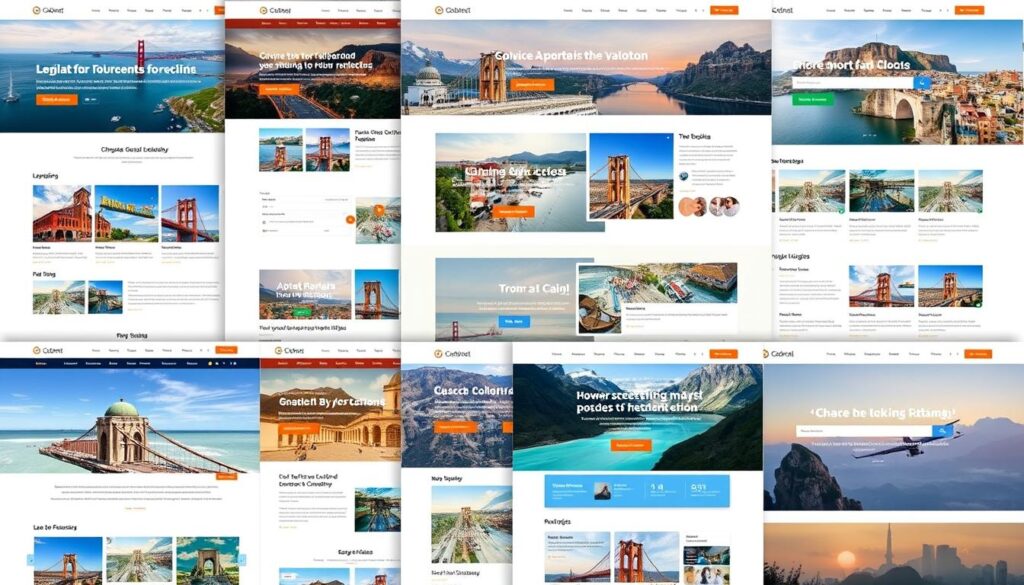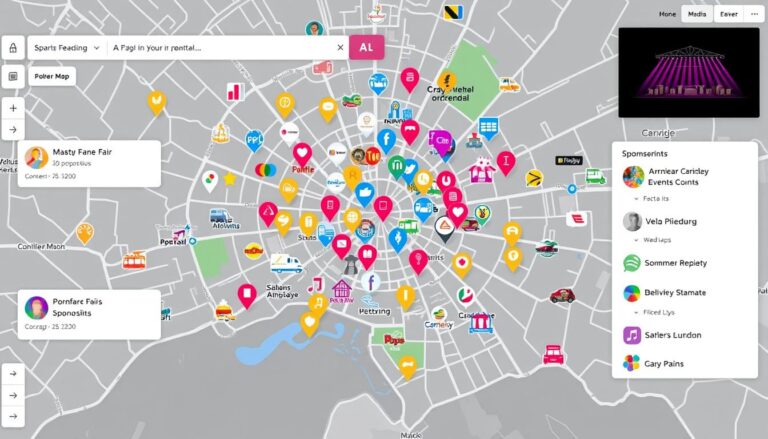Did you know over 50% of a successful location page’s content must be unique? This unique content greatly boosts local SEO success. Especially when aiming to excel in geographic targeting and making effective landing pages.
In today’s world, a *one-size-fits-all* strategy doesn’t work. For businesses in many locations, having SEO for each site is key. These special pages help to attract local customers. They also rank better in local search results, increasing both foot traffic and online presence.
To optimize for local SEO, include regional keywords and unique, valuable content. Use tools like *Google Keyword Planner*, *SEMrush*, or *Ubersuggest* for the best local keywords. Consistent business info and good reviews on Google My Business also help improve your rankings.
To stay competitive in local searches, making pages for each location is a must. Focus on unique content and precise geographic targeting. This makes your pages stand out, meet local search needs, and boost conversions.
What Are Location-Specific Pages?
Location-specific pages help businesses show up in local searches. They use special keywords and mention services and the local area. This helps a business connect with nearby customers.
Definition and Purpose
These pages are designed for a business’s specific area. They aim to draw in local web traffic. With content focused on location, they meet local needs and stand out in city searches.
The goal is to climb higher in local search rankings. This brings more relevant visitors and potential buyers to the company.

Why They Matter
Location-specific pages boost a business’s local online presence. They make a company more visible in local searches. This importance grows as more people look for nearby services or items.
By targeting local customers with specific content, companies become not just seen but also directly relevant to them.
Benefits of Local SEO Optimization
Local SEO optimization helps businesses grow online and reach local customers. Let’s look at the main advantages of this strategy.
Increased Visibility
Location-based marketing uses regional keywords. This makes a business more visible in local searches. Brightlocal’s 2022 survey says 98% of people look up local businesses online.
Google shows these location pages first because they match where users are. This helps your business stand out in the local market.
Customer Trust
Local SEO optimization builds trust with potential customers. It shows your business is a trusted part of the community. Trust is key, as nearly all shoppers read online reviews, says a 2023 stat.
Adding reviews and strong content on your pages boosts trust. It also helps your online reputation and search rankings.
Higher Conversion Rates
Pages made for local audiences attract more visitors. They also turn more visitors into customers. Content that speaks to local needs is more engaging.
This means more people are likely to buy because they feel the business understands them. It is also important to optimize for smartphones, as 79% of people use them to browse the web. This leads to better engagement and more sales.

How to Create Location-Specific Pages
It’s important for businesses to have good location-specific pages. This improves their local SEO scores. Unique content for each place attracts the local folks. With the right focus, businesses can get more visible in local searches.
Target the Right Keywords
Picking the right keywords is key. Do deep research to find terms that match your business and locations. Use these keywords in your content to show up in local searches.
Use phrases like “best coffee shop in Boston” or “plumbers near me in San Francisco.” Long-tail keywords work best because they’re specific and easier to rank for.
Ensure Accurate NAP (Name, Address, Phone)
Having the right NAP information everywhere is crucial. This information should be the same on your website, social media, and local directories. It builds trust and can boost your rankings.
Wrong NAP info can confuse customers and search engines. This might hurt your SEO efforts.
Implement Unique, Location-Specific Content
Make sure each location page has its own content. Don’t just change place names. Write about what makes each place unique, like local events or customer stories.
This kind of content makes your website more relevant and interesting. Google loves sites that offer unique and useful information.

Embed Google Maps and Location-Specific Images
Adding Google Maps helps customers find you more easily. It also tells search engines exactly where you are. This can help your local search rankings.
Also, use beautiful, specific images for each location. This makes your site look better and grabs people’s attention.
Use these strategies to make great location pages. This can increase local traffic and help turn visitors into customers. Doing this ensures your business shines in local searches, helping you succeed online and in person.
Creating Location-Specific Pages
Location-specific pages are key for a good local SEO strategy. They help a business stand out online. They give search engines and users exact information for each place. This makes a big difference.
Keeping the NAP (Name, Address, Phone) details consistent helps search rankings and builds trust. Nearly 21% of consumers look online daily for local businesses. It shows how vital accurate details are.
Using local keywords helps reach more people and improve rankings. Phrases like “pizza near me” are searched millions of times a month. Adding these keywords in URLs and content boosts visibility.

Good local pages need unique content that shows what’s special about each place. Important content features are:
- Location attributes and features
- Staff profiles
- Hours & NAP
- Customer reviews
- Photos and videos of the location and staff
Customer reviews build trust and can increase sales by 18%. Using Google Maps and specific images helps SEO. It attracts traffic from the 42% of people who use the Google Map Pack.
Mobile-friendly pages are a must. Almost a third of mobile searches are about locations. Fast, mobile-responsive pages reach a big audience. Highlighting unique selling points and clear calls to action improves user experience.
Structured data, or Schema, helps search engines understand your site better. It can make your location pages perform better.
The aim is to create pages that offer a great user experience and lead to high conversions. This is done through unique content and smart SEO work.
Common Mistakes and How to Avoid Them
When making location-specific pages, businesses often slip up. These mistakes can hurt their SEO efforts. Knowing how to dodge these pitfalls is key for strong location page authority.
Duplicate Content Issues
Duplicate content can really set you back with search engines. It’s vital to have unique location-based content on each page. Doing so dodges SEO penalties. Plus, it gives your customers valuable info that’s just right for them.

Orphan Pages
Orphan pages are not linked to your website’s other pages. They make your SEO work less effective. Ensuring every location page is connected within your site’s structure is important. This makes pages easy to find for search engines and people. It helps build location page authority.
Misleading Information
It’s crucial to provide accurate and current information. Doing so keeps your credibility intact. Misleading or old info can damage customer trust. Always update your business hours, addresses, and other key details. Adding great visuals and specific details to each location can also help. It makes the customer experience better and improves your search engine spot.
Examples of Effective Location Pages
There are many successful examples of location pages that show how to win at local SEO. By looking at these examples, we learn the importance of using specific regional keywords. We also see how keeping NAP data consistent and creating content for a local audience can help optimize local SEO efforts.

Case Study: NannyPod in Boston, MA
NannyPod’s page for Boston shines because it uses local keywords very well and has unique, high-quality content. This content connects with the Boston audience. It talks about the services in detail and shows why they are great for the local community. The page also makes the site more appealing by having correct NAP data and appealing visuals. This helps draw in local parents looking for childcare and leads to more actions taken on the page.
- Targeted local keywords to capture specific searches in Boston
- Unique, localized content that speaks directly to the Boston community
- Consistent and accurate NAP information
- Visual elements such as photos of local nannies and client testimonials
Case Study: Dr. Roof in Atlanta, GA
Dr. Roof’s page for Atlanta shows how vital correct NAP listings and local info are. It features profiles of the staff and mentions local landmarks, making a personal connection with the Atlanta people. A Google Maps link also helps visitors find them easily, making for a better customer experience.
- Accurate and consistent NAP data
- Profiles of local staff members to create a personal touch
- Google Maps embed for easy navigation
- Detailed descriptions of services with regional keywords
These examples show how important good location pages are. By using content that fits the location and targeting the right regional keywords, visibility, engagement, and conversion rates can go up. This showcases the power of good local SEO.
Conclusion
Making pages for each location is key to better local SEO. Understanding their role helps businesses use them well. This lets each page offer valuable content that locals find appealing.
Pages should have more than just basic info. They should give useful details like open hours and contact info. They should also include actual photos and customer reviews for that place.
Adding Google Maps and specific keywords boosts these pages. It’s important to avoid repeating content or having pages that stand alone. Adding local FAQs and unique features helps a lot.
Using links and structured data also helps pages show up in searches. It makes them more relevant to local questions.
For any business, online or with physical spots, targeting areas well is crucial. It builds trust and gets more people involved. It also leads to more people buying or using services.
Doing this well, along with keeping up with local SEO, really helps a business stand out locally. It makes a big difference in how successful they are online.




